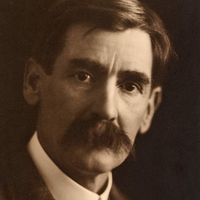The Bards Who Lived at Manly
The camp of high-class spielers,
Who sneered in summer dress,
And doo-dah dilettante,
And scornful “venuses”—
House agents, and storekeepers,
All eager they to “bleed”—
The bards who tackled Manly,
Were plucky bards indeed!
With shops that feared to trust them,
And pubs that looked askance;
And prigs who read their verses,
But gave them not a glance;—
When all were vain and selfish,
And editors were hard—
The bard that stuck to Manly
Was sure a mighty bard.
What mattered floors were barren,
And windows curtainless,
And our life seemed to others
But blackguard recklessness?
We wore our clothes for comfort,
We earned our bread alway,
And beer and good tobacco
Came somehow every day.
Came kindred souls to Manly—
Outsiders that we knew,
And with them scribes and artists,
And low comedians too;
And sometimes bright girl writers—
Called “Tommy”, “Jack”, or “Pat”—
(Though each one had a sweetheart
The rest knew nought of that).
’Twas not the paltry village
We honoured unaware,
Or welcome warm, or friendship,
Or “tone” that took us there;
We longed to sing for mankind,
Where heaven’s breath was free
We only sought the grandeur
Of sea-cliff, sands and sea.
And we were glad at Manly,
All unaware of “swells”,
Of doctors and of nurses,
And private hospitals;
With little fear of bailiffs,
And great contempt for greed—
The bards who lived at Manly,
They were a healthy breed.
Oh! moonlit nights at Manly,
When all the world was fair!
In shirts and turned-up trousers
We larked like big boys there.
Oh! glorious autumn mornings—
The gold and green and blue—
We “stripped” as well as any,
And swam as strongly too.
The artist had a missus,
Who rather loved the wretch,
And so for days together
He’d stay at home and sketch.
And then—I fear ’twas only
When things were getting tight—
The bards would shun each other,
And hump themselves—and write.
When bailiffs came to Manly
They’d find no “sticks” to take,
We’d welcome them as brothers—
Their grimy hands we’d shake;
We’d send for beer in billies—
And straightway send for more—
And bailiff nights in Manly
Were merry nights of yore.
There are some things that landlords
And law can’t do at all:
They could not take the pictures
We painted on the wall;
They could not take the table—
The table was a door;
They could not take the bedsteads—
The beds were on the floor.
The door of some old stable—
We’d borrowed for a drink—
A page of rhymes and sketches,
And stained with beer and ink;
A dead hand drew the portraits—
And, say, should I be shamed,
To seek it out in Manly
And get the old door framed?
They left the masterpieces
The artist dreamed of long;
They could not take the gardens
From Victor Daley’s song;
They left his summer islands
And fairy ships at sea,
They could not take my mountains
And western plains from me.
One bailiff was our brother,
No better and no worse—
And, oh! the yarns he told us
To put in prose and verse,
And sorry we to lose him,
And sorry he to go—
(Oh! skeletons of Pott’s Point,
How many things we know)!
The very prince of laughter,
With brains and sympathy;
And with us on the last night
He spent his bailiff’s fee.
He banished Durkin’s gruffness,
He set my soul afloat,
And drew till day on Daley’s
Bright store of anecdote.
He said he’d stick to business—
Though he could well be free—
If but to save poor devils
From harder “bums” than he,
Now artist, bard and bailiff
Have left this vale of sin—
I trust, if they reach Heaven,
They’ll take that bailiff in.
The bards that lived in Manly
Have vanished one and one;
But do not think in Manly
Bohemian days are done.
They bled me white in Manly
When rich and tempest-tossed—
I’ll leave some bills in Manly
To pay for what I lost.
They’d grab and grind in Manly,
Then slander, sneer, and flout.
The shocked of moral Manly!
They starved my brothers out.
The miserable village,
Set in a scene so fair,
Were honester and cleaner
If some of us were there!
But one went with December—
These last lines seem to-night
Like some song I remember,
And not a song I write.
With vision strangely clearer
My old chums seem to be,
In death and absence, nearer
Than e’er they were to me.
Alone, and still not lonely—
When tears will not be shed—
I wish that I could only
Believe that they were dead.
With hardly curbed emotion,
I can’t but think, somehow,
In Manly by the ocean
They’re waiting for me now.

